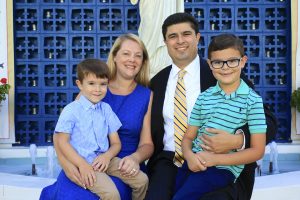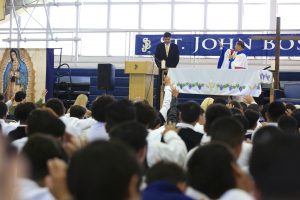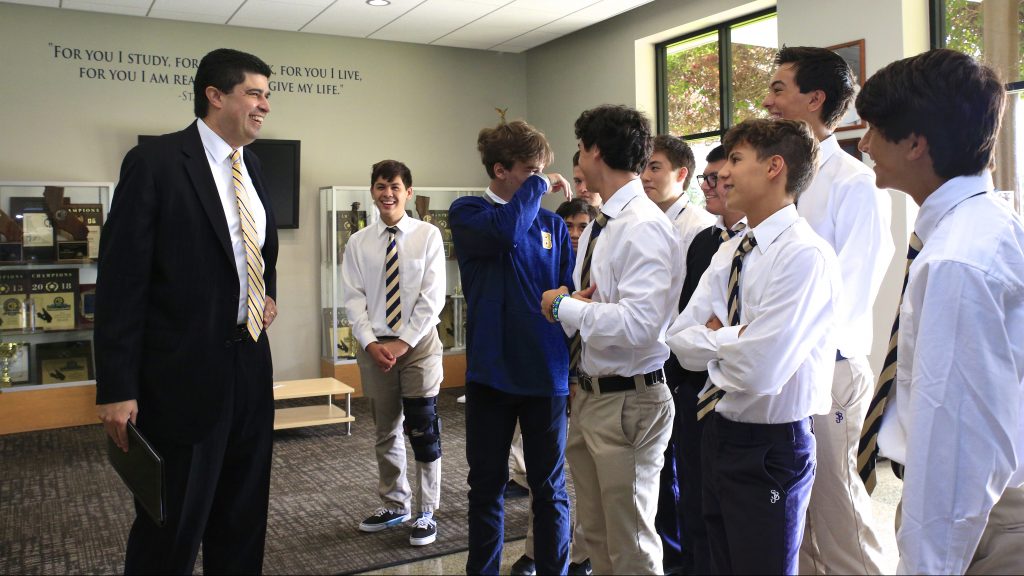The quote on the wall above the main entrance at the St. John Bosco High School gym — “Education is a matter of the heart” — is attributed to the school’s namesake.
Paul Escala, a St. John Bosco Class of 1996 graduate who came back 14 years later to begin a six-year term as the president and CEO of the all-male prep school, put his educational heart on display during a visit to the Bellflower campus last Thursday morning, joining more than 800 students for a Mass celebrating the feast day of the Assumption of Mary.
This time, he wasn’t just there as an alum or president emeritus. He was the Archdiocese of Los Angeles’ newly named senior director and superintendent of schools.
“It was very humbling,” said Escala after the Mass that included him proclaiming the first reading, receiving a blessing from the student body, and delivering a 10-minute inspirational speech about how to find one’s calling through God’s will.
“I never had trouble speaking in front of the faculty, it was the boys that was more nerve wracking,” Escala added with a laugh. “It was great to be home literally and figuratively.”
Escala talked to Angelus News about his past experience, new position and what’s in store for the future of LA’s Catholic schools.
After 17 years in education, you decided to take your family to Bakersfield for a position with a charter school company. Now you’re back. What attracted you to this position at this point in your career?
Going to Bakersfield was about a promise I once made to my grandfather. He came to this country from Mexico as a migrant farm worker though west Texas and Kansas in the early 1900s, experiencing all kinds of extraordinary racism and bigotry as a newly arrived immigrant. He finally came to California and then Simi Valley.
He was the smartest man with the least amount of formal education I ever knew of anyone. He taught me everything. Before he passed, I promised that if I had the chance to work in the type of community that he grew up in, hard-working migrant farm workers, I would do that.
I was also raised by a single mother, a Chicana activist who marched with Cesar Chavez. When this calling came to extend my ministry in the Central Valley, I couldn’t say no. My family was young enough to move and I knew that work was going to reward me in a deeply personal way. I also knew it wouldn’t be forever. My family and friends are here in LA, and I knew God would call me back one day, maybe sooner than I expected.
This job came to me and I was intrigued by it. I’ve been blessed to have a significant network of contacts in Los Angeles over the last 20 years, so I reached out, did some due diligence, and overwhelmingly what drew me to this was, after all the years I have been in education and in different facets within the sector, I found this as an opportunity for me to come back and help form a new era in Catholic education.
It probably sounds extraordinarily ambitious just saying it. But it’s necessary as far as I’m concerned. Secularism in many respects has not only suggested, but said it outright to the public, that religion means nothing and you should worship other things. I’m still learning a lot, but one thing I do know is there is something far bigger than us and something more than self-satisfaction, particularly in the world of education.
So for me, the calling is to create an opportunity to leverage this incredible Catholic legacy since 1851 in Los Angeles and help form this region. So many who have benefited from Catholic education have done incredible things. There is a reason why Catholic education must continue to prosper and thrive for the betterment of the society. I want to learn and listen from a lot of people, take in all the great ideas and find ways to amplify access for the neediest children, create relevancy where many students may feel Christ’s message isn’t relevant to them, and most of all, I want to give back.
This goes back to the beginning where it all started for me, to give back to an institution and a community who helped form who I am today and are now helping to form my own children.
Are you bilingual?
No, I am not. My grandparents steeped into me and my mom the importance of English. My grandfather spoke only broken English but he was a very avid reader despite having only a fifth-grade education, and my grandmother had an eighth-grade education. They both recognized some of the limitations they faced was due to the lack of a command of the English language. So they demanded I learn English really, really well.
In hindsight, as admirable and noble as that was, I found over the years there are limitations for me and I want to remedy that. I want to re-encounter a language that was around me as a child and also impart that onto my own kids. That will translate to broader success in this school system as well. I’m eager to learn more about the work many have done in the area of dual language and dual immersion programs around the archdiocese. It’s an opportunity to encounter a whole group of families who feel that traditional schools are not reaching them and are not accessible to them. We want to replicate that not just with Spanish but many other languages.
What was your Catholic upbringing like?
I grew up with my mom and grandparents in a one-bedroom duplex in the Barton Hill area of San Pedro right near St. Peter’s Catholic Church, and the church was our life — going to Mass, fiestas, with my mom to meetings, as she was in ministries. My grandmother had an altar set up at home, and she would give everyone a sign of the cross when someone left our home. My cousins joked that my grandmother had a direct line to the pope.
When I started going to school at Holy Trinity, my mom worked for the County of LA as a social services director in San Pedro. My holidays were spent working with homeless and elderly, calling bingo at senior citizens club.
In high school, I was far better in the classroom than on the basketball court — even though I’m 6-foot-5. I found myself more in the classroom and in theater, and doing community service. I still remember getting a Christian Service Award from the archdiocese at St. John Bosco and having my picture taken with Cardinal Mahony at St. Vibiana’s.

What experiences with the Los Angeles Unified School District as well as working with charter schools give you a deep institutional knowledge of education here that you can apply to the Catholic schools?
When I started at LAUSD in 1999, Mike Lansing, a former teacher and coach of mine at Holy Trinity, just got elected to the school board, and I just came back from Cornell and met him at the Boys And Girls Club to ask for some advice. I had some opportunities in city and regional planning, the field I studied, but he was looking for staff and gave me my first gig. I thought it would be two years there, then to law school, but I never looked back and stayed in education.
This was simultaneously a time of opportunity and crisis in the LAUSD, and Mike always had a different perspective on public education from his Catholic experience. It came down the fundamental principle of leadership. The district suffered from a poor infrastructure.
There are some incredible people doing God’s work in the secular world of LA Unified every single day, creating minor miracles. But all we hear is LA Unified versus charter schools. But so many seem to lose their way and forget it’s ultimately about kids. That’s the hope and prayer I have for Catholic education — to remind Angelenos from Santa Barbara and Santa Maria to Glendora that Catholic educators and leaders and families and congregations throughout this archdiocese have been doing God’s work every single day.
I also learned about the fundamental value of subsidiarity, that really the best solutions are best found locally. That’s the difference between us and the work of our peers in the public system. Centralized bureaucracies often fail communities.
We need to find a balance between solidarity and subsidiarity. I recognize so many of our parish schools have been challenged tremendously by financial limitations, enrollment declines, and it’s easy to say, ‘We’ll just close this school.’ We need to come back to what is fundamental to our faith and to our difference — local decisions and ownership is key. We need to employ new tools and assets to find solutions to long-term sustainability problems. Whether it’s new models of business within the schools, to lower costs, support a micro-school concept for just 30 to 50 kids, we cannot allow ourselves to get caught in a binary choice between “open” or “closed.” There is another way. It’s going to take some leaps of faith from people.
With what you’ve seen in your educational leadership journey, do you have ideas you’re ready to implement as soon as possible?
I realize there has been so many who have come before me who have had incredible ideas, some succeed and some fail. I continue to remind myself to listen to what we keep telling our kids — don’t be afraid to fail.
I’m a big Rocky Balboa fan. I love movies and growing up in LA, movies have always been part of my life. The “Rocky” story has touched my heart and soul on a personal level — having those “Rocky moments” of getting knocked down, being alone in the ring and telling yourself to get up and keep fighting. There’s a grittiness and perseverance about Catholics, our Church, our faith, our schools, our congregations.
In spite of all the challenges we’ve experienced most recently, the faith is within the people. We need to look within ourselves for the solutions. I fully acknowledge I don’t have all the answers but what I bring to the table is a different perspective. I come from the system, but I’m not of the system. That will provide some moments of refreshing opportunity, maybe some pushback, but I’m prepared for both. Ego and pride can’t get in the way.

Where do you draw your energy, this outlook for positive results?
At a very young age, I had a dream that I interpreted as a vision — my life may not be very long, and God could take me sooner than when I want. I’ve operated from that perspective my entire life.
My principal at St. John Bosco told me my first year: Paul, you’re in such a hurry, why do you go so fast? I finally was able to tell him where that comes from. I believe God brings people together in these moments. We need to take advantage of these moments because they might not last.
I will operate with extraordinary passion, with due haste, but also find a balance between assertiveness and opportunity along with the responsibility that comes with that job to slow down at moments, to take a breath for myself as well as everyone around me, and also recognize you have to appreciate the moment you’re in as well.
How do you identify the priority of challenges you want to take on?
From where I come from academically, I look at trend lines as a planner. Demographics are shifting. Working families have less discretionary income. Costs keep rising. Competition is fierce. As there are fewer children in the region, you form conclusions about where we are going. It’s about re-engaging and re-encountering families with a portfolio of options, not just one single way of doing things.
I want to push the envelope even further. We focus on the fundamentals and faith formation piece, which parents really want and are looking for, but we have to create access, which comes through a variety of administrative and financial models that are going to look different and will operate differently but will be responsive to the market. Parents today demand more personalization from schools. That’s not only a technologically driven solution. One of the most important pieces to educational models that we experienced is relationships with teachers and ministers. This is where the rubber meets the road in the human engagement perspective.
We have to leave ourselves open to certain realities in certain communities. The schools that we have seen operate the last 50 to 70 years are not likely to operate the same any longer. What the congregation, the community, the neighborhood might need more today is a more a mix-use approach to that brick-and-mortar. Maybe it’s a pre-school or day-care facility, coupled with workforce housing and health care facility. We are in one of the most dense, urban cores in the world. We have to think differently from a planning and asset perspective how we’re using this to be responsive to the community.
The Archdioceses of Los Angeles is one of the few realities that has a footprint in every neighborhood in this region. Cardinal Manning was brilliant in planning so that you don’t have to go more than a mile to reach a church. There’s a reason for that. So let’s take that thinking for 2019 and where we’re going to be in 2050. We’ll need to be more responsive to a growing population on the whole that needs to encounter Christ in very different ways. We can’t keep doing things the same way and expect a different result.
The C3 initiative spearheaded by Archbishop Gomez encourages teachers to be creative with today’s technology. How does new school implementation mesh with old-school ideas?
We have an interesting confluence of rapidly accelerated technological tools colliding with a tradition form of learning that humans have had since the beginning of the western civilization. As a steep learner in the Socratic Method, I can tell you there is nothing more powerful than the engagement of discourse and dialogue between people. That will not change. As we fundamentally integrate technology into our lives we’re going to have to find this balance.
Yes, I can get an answer to a question from Google, but content knowledge isn’t what we’re doing at the schools any more. My 7-year-old is problem solving; learning fundamental skills that came in preschool and kindergarten at the Catholic schools. I think where the balance is struck is by leveraging technology in a manner that will facilitate a pedagogical approach to higher functional skills in learning and thinking. Analytics may be driving a lot of decisions, but we have to recognize technology as an asset and tool no different than the pencil or dry erase board or projector was.

